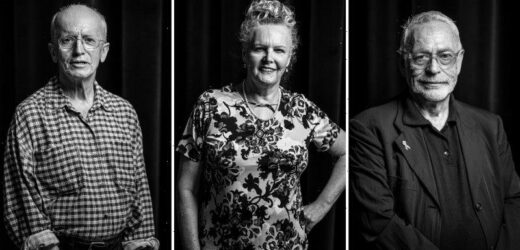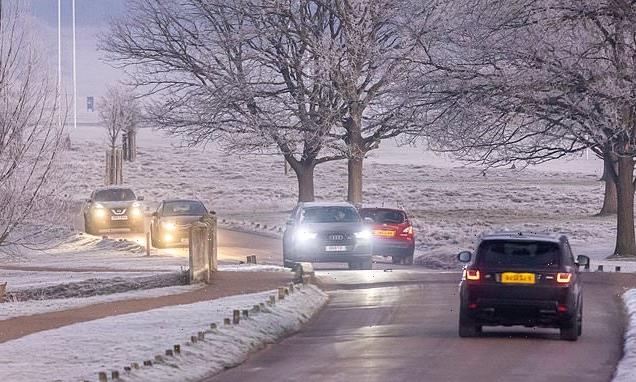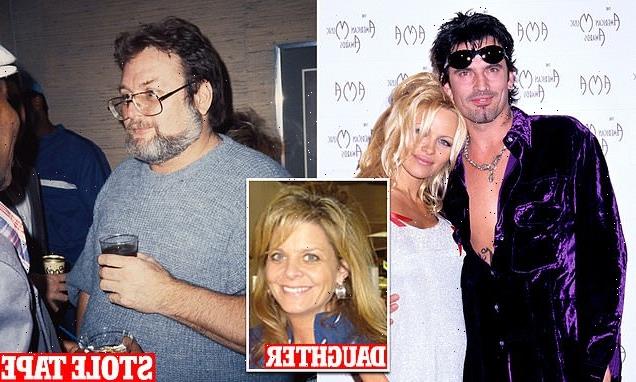By Billie Eder
David Polson, Colleen Windsor and Trevor Pritchard are all passionate about the visibility of LGBTQI+ elders.Credit:Wolter Peeters
When David Polson was living in Surry Hills in 1984, Oxford Street was a very different place from today.
“Oxford street then was vibrant, fun and full of life,” Polson said.
But the street that is synonymous with Sydney’s annual Mardi Gras parade was also holding a secret. A secret that men like David were sworn to keep as it seeped into Sydney’s veins.
“In 1984, I was one of the first 400 people diagnosed with HIV/AIDS. Then of course it was a death sentence,” Polson said.
“We were also told not to tell anyone. So, we were told we were going to die, but we couldn’t tell anyone because of the dreadful atmosphere of fear and hatred.”
David Polson AO spent 30 years of his life undergoing clinical trials to help find a cure for HIV/AIDS.Credit:Wolter Peeters
Polson sat by the bedsides of friends in Ward 17 South at St Vincent’s Hospital, Australia’s first dedicated HIV/AIDS unit, as the virus took hold and eventually ended their lives.
“I thought, David, you’ve got a duty here. You’ve got a duty to help. Because no one knows about what this is,” Polson said.
“So, I said to my doctor, I will do anything I can to help medical science find a treatment or a cure. Whatever I can do, I will do.”
For the next 30 years, Polson underwent more than 28 drug trials with Professor David Cooper, most of which left him with unbearable nausea and side effects.
Today, nearly 40 years after his diagnosis, Polson continues to be an advocate for the LGBTQI+ community and for reducing the ongoing stigma of HIV/AIDS.
He also advocates for LGBTQI+ people who, in their older age, are facing a new kind of isolation.
Polson was among the people at Glebe Town Hall one Friday afternoon in late January, taking part in an LGBTQI+ elders dance club. It’s an event hosted across the country by All The Queen’s Men (ATQM), an arts organisation that champions equality and connection.
Tristan Meecham, co-founder of ATQM, said the organisation’s dance events were age-inclusive and accessible to make it easy for elderly LGBTQI+ people. Run with ACON’s The LOVE Project, a program aimed at empowering older LGBTQI+ people, the dance club aims to keep older people engaged and active in their local community to combat issues like social isolation and loneliness.
Co-founder of All The Queen’s Men, Tristan Meecham, helps organise LGBTQI+ events that are age inclusive.Credit:Wolter Peeters
For Sydney WorldPride, Meecham and ATQM are holding an event at Sydney Town Hall on February 18 called The Coming Back Out Salon, which is similarly intended for elder LGBTQI+ people, and is a twist on the company’s Coming Back Out Ball which has been held in Melbourne since 2017.
“It was inspired by an academic work that revealed that LGBTQI+ elders were closeting themselves in aged care environments,” Meecham said.
“It was also a project that was really around reconnecting with older members of the LGBTQI+ community to create more of an intergenerational connection.
“This is our attempt to make sure there’s inclusive programming for all ages, and all experiences… It’s an opportunity for us as younger LGBTQI+ people to really create a space for those that have come before.”
Come 2pm on February 18, Sydney Town Hall will have been transformed into a pride celebration, with live music from the likes of Robyn Archer and Deborah Cheetham.
Australia’s elder LGBTQI+ community can be more vulnerable to social isolation than their heterosexual counterparts, said Russ Gluyas, program coordinator for the LOVE Project.
Ageing can bring anxiety for LGBTQI+ people who fear they won’t be accepted or understood if moved into assisted living or aged care, said Gluyas, a fear which can be heightened if a person is HIV positive.
Russ Gluyas from ACON’s the LOVE Project is bringing awareness to the needs of the elder LGBTQI+ community.Credit:Wolter Peeters
“I think one of the greatest fears of older LGBTQI+ people is moving into aged care, knowing that it might not be inclusive,” Gluyas said.
“The lived experience of older LGBTQI+ people, and older LGBTQI+ people living with HIV, is that they’ve gone through years of stigma, discrimination and feeling really hidden, and having to be secretive about accessing any service, but health services in particular.
“And now as they get older, it’s almost like, do I have to come out again? Do I have to reveal myself again, and how will I be received?”
It’s something that resonates with Polson who, although isn’t in aged care, has seen first hand the animosity towards HIV positive people.
“Yes we are different, and we need to be treated differently. We need to be treated discreetly, particularly with the medications because people in those homes, elderly people, or anyone, can be quite vicious even today if they find out someone is HIV positive,” Polson said.
Colleen Windsor, who moved to Australia from the UK in the 1970s, is recently retired after a successful career in the public service. Having previously volunteered for a number of LGBTQI+ organisations, including Trans Pride Australia, Windsor is now on the LOVE Project’s committee.
“The LOVE Project is all about breaking down isolation and loneliness, and I think [that’s important], especially now considering older trans women, there are many that don’t have partners,” Windsor said.
“So, me being seen to be part of the LOVE Project committee, shows the older trans community that this organisation is for them as much as it is for gay men or lesbians. That was one of the reasons I wanted to do it, and continue to do it. [And] I think it shows because many trans women are starting to appear at our workshops now, which is fantastic.”
Colleen Windsor said that the LOVE Project was breaking down barriers of isolation and loneliness.Credit:Wolter Peeters
Windsor, who is also a retired showgirl and was a performer in Sydney’s famous cabaret show Les Girls in Kings Cross in the mid-1970s, said having The Coming Back Out Salon in “the grandest room in Sydney” would be a fantastic experience for the whole LGBTQI+ community.
And while events like the LGBTQI+ dance clubs and The Coming Back Out Salon help to engage the older community, there’s still work to be done, said Gluyas.
“What we are trying to do is create safe and welcoming environments for older people to come in and make new friends and build their support networks.
“It’s about continuing to work towards inclusion, for everybody in services. That means a lot of training and education.”
A cultural guide to going out and loving your city. Sign up to our Culture Fix newsletter here.
Most Viewed in Culture
Source: Read Full Article







